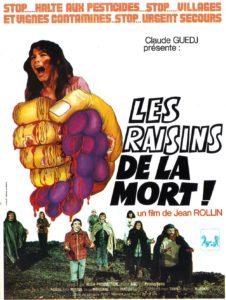 From Jean Rollin, France’s foremost horrormeister, a somewhat derivative yet undeniably artful zombie mash that really delivers the gore groceries. If nothing else, it’s probably Rollin’s most accessible picture, and certainly his most enjoyable.
From Jean Rollin, France’s foremost horrormeister, a somewhat derivative yet undeniably artful zombie mash that really delivers the gore groceries. If nothing else, it’s probably Rollin’s most accessible picture, and certainly his most enjoyable.
Jean Rollin’s sexy, surreal films occupy an unsteady ground between exploitation and art. Horror fans bred on American made fare tend to find Rollin’s work slow moving and pretentious, while most everybody else is turned of by the explicit gore and sex. In other words the films are, in the words of CAT PEOPLE (1982) helmer Paul Schrader, “too arty for the blood crowd and too bloody for the art crowd.” Rollin’s sensibilities are fully in line with those of Spanish horrormeisters like Jorge Grau and Jess Franco (Rollin actually completed a Franco project called ZOMBIE LAKE, and furthermore hired several Spanish horror veterans to execute TGOD’s impressive gore FX), but he had the misfortune to be based in France, not the most hospitable environ for horror movies.
GRAPES OF DEATH (LES RAISONS DE LA MORT; 1978) is often dismissed by Rollin devotees as a cut-rate NIGHT OF THE LIVING DEAD knock-off; well, yes, the film was clearly inspired by George Romero’s classic, but Rollin nevertheless manages to inject many of his signature touches, making for a unique and stylish gore fest.
A young woman, together with a friend, is traveling via train to meet her boyfriend at his home in a rural town. She’s attacked by a strange man with an ugly rash spreading across his face who kills her friend. Escaping the train, the woman finds herself lost in a strangely depopulated countryside. Her first stop is a cabin occupied by a zombie-like man and his wife; the place has an ominous air, and it turns out that the man has killed his mother and left her body in a bed upstairs—furthermore, the murderer bears a facial rash similar to that of the freak aboard the train.
Escaping the man’s clutches, the woman is attacked by more psychotic folks with rashes covering their faces. She meets up with a sympathetic blind lady, but that alliance is shattered by the latter’s lovesick ex, who crucifies and decapitates her. A far more solid alliance is formed when the heroine meets up with a par of burly, gun-toting men unaffected by the disease. The trio makes their way to the protagonist’s boyfriend’s house, situated in the middle of a winery. It turns out the grape fields that supply the winery have spread some strange malady that turns people into homicidal zombies. Naturally, the area isn’t much of a haven; just the opposite, in fact. In true NIGHT OF THE LIVING DEAD fashion, all the “heroes” are killed off but one…and, in the end, her continued survival is far from assured.
Whatever else it may be, Jean Rollin’s filmmaking is utterly distinctive. The scantly clad, attractive young women who populate the film are familiar sights (porn star Brigitte Lahai, who plays the blind woman, is a Rollin regular), and even if they don’t end up in an old castle populated by horny vampires (the director’s standard plotline), the dreamlike aura that pervades their wanderings is pure Rollin.
As in his other films, the narrative was largely improvised and the overall atmosphere is a deceptively quiet one. Another distinctive touch is the way the camera lingers lovingly and lengthily over the gore, which is quite copious. Highlights include the singularly nauseating sight of a guy banging his festering head against a window and leaving behind a smattering of yellow puss; equally vile is the infamous crucifixion/decapitation scene…followed up by the even more startling sight of the perpetrator madly smooching the severed head!
Vital Statistics
THE GRAPES OF DEATH [LES RAISONS DE LA MORT]
Synapse Films
Director: Jean Rollin
Producer: Claude Guedj
Screenplay: Jean Rollin
Cinematography: Claude Becognee
Cast: Marie-Georges Pascal, Serge Marquand, Felix Marten, Patricia Cartier, Mirella Rancelot, Brigitte Lahaie, Patrice Valota, Michel Herval, Paul Bisciglia, Olivier Rollin, Francois Pascal, Evelyne Thomas
